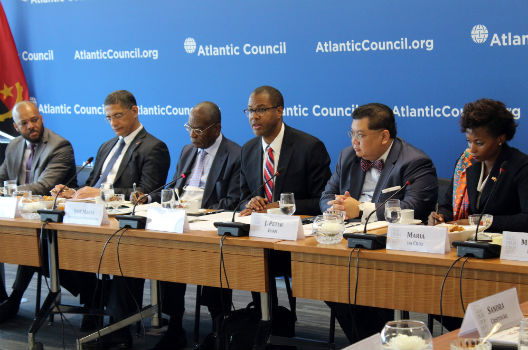 On Tuesday, August 2, the Atlantic Council’s Africa Center, in partnership with the US-Angola Chamber of Commerce, hosted a roundtable on US-Angola energy opportunities. Coming on the heels of the official US-Angola Strategic Energy Dialogue that took place on Monday, August 1, at the US Department of State, the event welcomed a delegation of Angolan dignitaries, US government officials, and private sector representatives.
On Tuesday, August 2, the Atlantic Council’s Africa Center, in partnership with the US-Angola Chamber of Commerce, hosted a roundtable on US-Angola energy opportunities. Coming on the heels of the official US-Angola Strategic Energy Dialogue that took place on Monday, August 1, at the US Department of State, the event welcomed a delegation of Angolan dignitaries, US government officials, and private sector representatives.
Africa Center Director J. Peter Pham, US-Angola Chamber of Commerce Executive Director Maria da Cruz, and Angolan Ambassador to the United States H.E. Agostinho Tavares da Silva Neto welcomed attendees and expressed their hope that the ensuing dialogue would focus on the vital role of the private sector in strengthening and diversifying Angola’s energy mix.
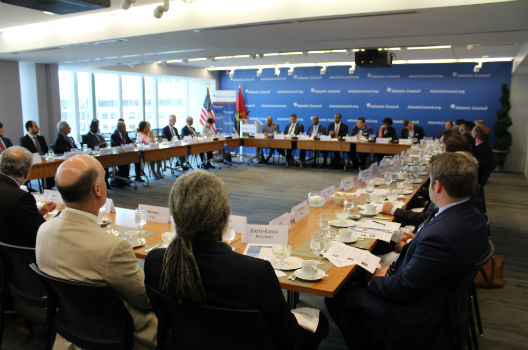
US Ambassador to the Republic of Angola the Honorable Helen La Lime spoke briefly, noting the importance of Angola’s plans to become an energy exporter to the region by 2025, using a combination of petroleum, hydro, and natural gas resources. She also expressed her hope that the US private sector would play a greater role in encouraging Angola to diversify its economy.
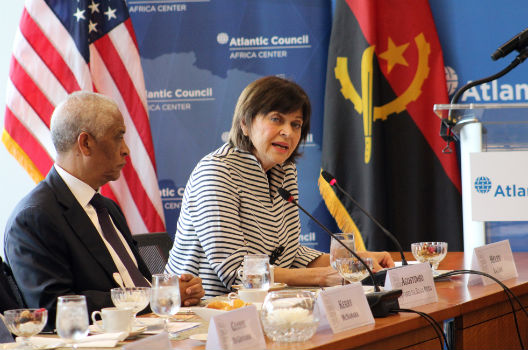
Left to right: His Excellency Agostinho Tavares da Silva Neto, Angolan ambassador to the United States; and The Honorable Helen La Lime, US ambassador to the Republic of Angola
Deputy Assistant Secretary for Europe, the Middle East, and Africa at the US Department of Commerce Michael Lally cited the relevance of the roundtable, particularly in advance of the US-Africa Business Forum to take place in New York City this September. He lauded the small- and medium-sized companies that have focused their attention and resources in Angola’s energy sector. He noted that this increasing interest unscored a broader trend in the American private sector—businesses no longer require convincing of Africa’s economic potential, but instead focus on the logistics of how to do business on the continent.
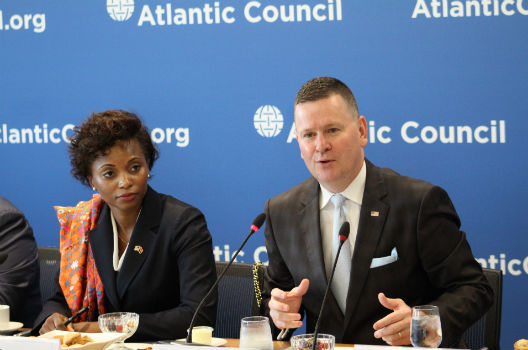
Left to right: Maria da Cruz, executive director of the US-Angola Chamber of Commerce; Michael Lally, deputy assistant secretary for Europe, the Middle East, and Africa, US Department of Commerce
Assistant Secretary for Fossil Energy at the US Department of Energy Christopher Smith provided the roundtable’s keynote remarks. He noted the importance of public-private partnerships in the development of oil infrastructure and discussed Angola’s progress as a natural gas producer. Smith suggested that African energy producers like Angola can capitalize on technological innovations—much like those which led to Africa’s early adoption of cell phone technology—to diversify their economies and create strong and sustainable energy sectors.
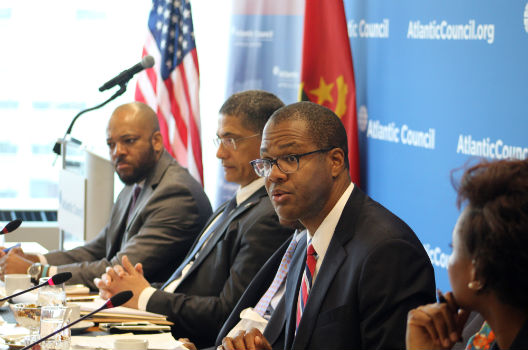
Left to right: Renato Almeida, manager, international government affairs – Africa, Chevron Corporation; His Excellency João Baptista Borges, Angolan minister of energy and water; and The Honorable Christopher Smith, assistant secretary for fossil energy, US Department of Energy.
H.E. João Baptista Borges, minister of energy and water, then provided an overview of the Angolan energy sector. Following the end of Angola’s civil war in 2002, the government undertook a massive infrastructure rebuilding effort. In 2013, the government implemented an energy plan that plans to triple the country’s energy production—primarily via hydropower—by 2025. A key tenet of this national plan relies on the mobilization of private sector resources.
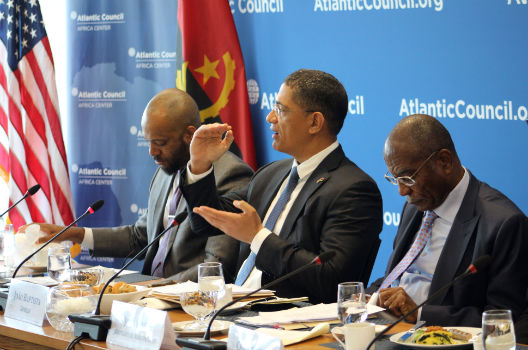
Left to right: Renato Almeida, manager, international government affairs – Africa, Chevron Corporation; His Excellency João Baptista Borges, Angolan minister of energy and water; His Excellency José Maria Botelho de Vasconcelos, Angolan minister of petroleum.
H.E. José Maria Botelho de Vasconcelos, minister of petroleum, remarked on the economic difficulties brought on by volatility in the world oil market. As a result, he noted, investment in exploration and production have declined. But Vasconcelos remained positive that Angola is home to key, new investment prospects—including large natural gas finds—and given the right regulatory environment and private sector involvement, the Angolan government could meet its development and energy goals.
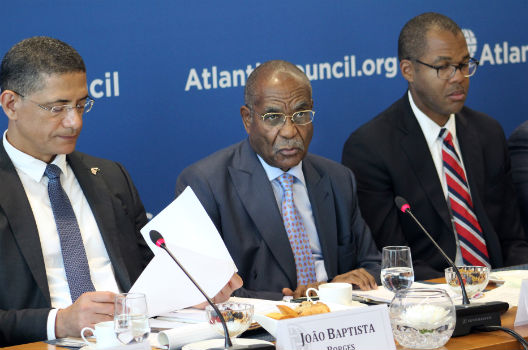
Left to right: His Excellency João Baptista Borges, Angolan minister of energy and water; His Excellency José Maria Botelho de Vasconcelos, Angolan minister of petroleum; The Honorable Christopher Smith, assistant secretary for fossil energy, US Department of Energy.
A discussion moderated by Renato Almeida, international government affairs manager for Africa of Chevron, which sponsored the event, followed the prepared remarks. In it, participants discussed Angola’s broader economic prospects and challenges.
Also in attendance at the roundtable was H.E. Maria Ângela Teixeira da Alva Sequeira Bragança, secretary of state for cooperation at the Ministry of External Affairs, and H.E. Teodolinda Rodrigues Coelho, ambassador and Americas director at the Ministry of External Affairs.

Image: Left to right: Renato Almeida, H.E. João Baptista Borges, H.E. José Maria Botelho de Vasconcelos, The Hon. Christopher Smith, Dr. J. Peter Pham, Maria da Cruz.
